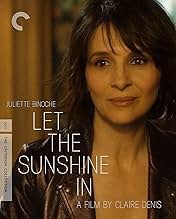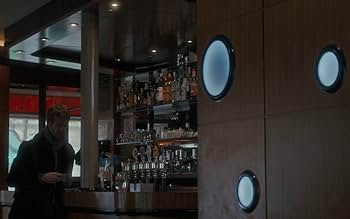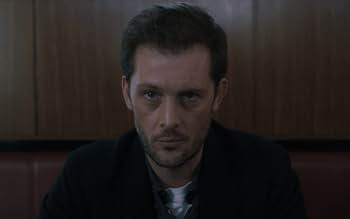VALUTAZIONE IMDb
6,0/10
8161
LA TUA VALUTAZIONE
Isabelle, artista parigina e madre divorziata, è alla ricerca dell'amore, del vero amore finalmente.Isabelle, artista parigina e madre divorziata, è alla ricerca dell'amore, del vero amore finalmente.Isabelle, artista parigina e madre divorziata, è alla ricerca dell'amore, del vero amore finalmente.
- Regia
- Sceneggiatura
- Star
- Premi
- 2 vittorie e 13 candidature totali
Recensioni in evidenza
... in its focus on unsatisfactory relationships - and it even has Depardieu in a pointless cameo role!
At one level, it's not too surprising that a well-regarded female artist of a certain age would have trouble finding a suitable partner following her divorce. However, her inability does seem at least somewhat self-inflicted, as she keeps latching on to married and otherwise unavailable men - some of whom are clearly complete arseholes. Indeed, there were so many of these I lost track of who was supposed to be "just a friend" and who was her current lover, and what might happen in her future.
Worth a look, but not Binoche's best, IMHO.
At one level, it's not too surprising that a well-regarded female artist of a certain age would have trouble finding a suitable partner following her divorce. However, her inability does seem at least somewhat self-inflicted, as she keeps latching on to married and otherwise unavailable men - some of whom are clearly complete arseholes. Indeed, there were so many of these I lost track of who was supposed to be "just a friend" and who was her current lover, and what might happen in her future.
Worth a look, but not Binoche's best, IMHO.
"You don't have to go looking for love when it's where you come from" - Werner Erhard
Isabelle (Juliet Binoche, "Ghost in the Shell"), a divorced fiftyish artist, is attractive, urbane, and highly intelligent but her relationships seem to have a built-in mechanism for self destruction. The men in Isabelle's life offer her little except temporary physical pleasure and are pretty much ciphers (and not very nice ones at that). Loosely based on Roland Barthes' book "A Lover's Discourse: Fragments" with a screenplay by Christine Angot, Claire Denis' sophisticated comedy/drama Let the Sunshine In (Un beau soleil intérieur) is lighter fare than normal for Denis, but it has its probing, self-reflective moments and Juliet Binoche, as usual, is an appealing screen presence.
Like many of us, Isabelle wants to find someone who fits her pictures but, as most of us discover sooner or later, life often does not fit our pictures. All of Isabelle's relationships start out to be very promising but eventually the decisions she makes about her partners seem to get in the way of her satisfaction. Whatever she thinks that she is looking for, she does not find it with either banker Vincent (Xavier Beauvois, "Django"), actor (Nicolas Duvauchelle, "Wedding Unplanned"), ex-husband Francois (Laurent Gréville, "A Perfect Man"), or any other potential beau for that matter. The film begins with Isabelle in bed with the married, pretentious Vincent. Things are looking a-ok until she decides that he is taking too long to climax, a fact she decides reflects badly on her.
Vincent asks her whether she has had more success with other lovers, but her response is a convincing slap in the face. She is with him when he bullies a bartender but she does not react. The next time he visits her in her apartment, however, she calls him an unrepeatable name, then tells him to leave and not come back. Instead, she hooks up with a young actor (Duvauchelle), also married, though with a better disposition. When she invites him in for a drink, they play endless games about whether he should stay or leave. When he decides to stay, they go through the motions together but by the next morning he concludes that things were better before they had sex and wishes that it had not happened.
The next one up is François (Gréville), Isabelle's ex-husband, who is concerned about their ten-year-old daughter after she tells him that her mother cries every night. This is not good news for her to hear and she uses it as a reason to end any chance for reconciliation. There are several more suitors that follow but Isabelle always finds something about them that she dislikes. She meets Sylvain (Paul Blain, "All is Forgiven") at a club who literally carries her away with pleasure as they dance to Etta James' beautiful "At Last." Unfortunately, Fabrice (Bruno Podalydès, "Chocolat"), an art gallery owner, convinces her that Sylvain is wrong for her because he is not a good fit for her circle. This provides cover for her to end yet another relationship, one that had barely even begun. There is not much left for her of course but to go to a clairvoyant (Gerard Depardieu, "You Only Live Once"), but his banter provides little certainty that she will find "the one." There are times in Let the Sunshine In when Isabelle has moments of happiness and optimism, but she can also come across as needy and, at times, almost desperate. Through the magic of Binoche's performance, Isabelle is a sympathetic figure and one that we root for. Her quest, however, has a touch of game playing to it and it seems that, for Isabelle, it may not be whether you win or lose but how you play the game.
Isabelle (Juliet Binoche, "Ghost in the Shell"), a divorced fiftyish artist, is attractive, urbane, and highly intelligent but her relationships seem to have a built-in mechanism for self destruction. The men in Isabelle's life offer her little except temporary physical pleasure and are pretty much ciphers (and not very nice ones at that). Loosely based on Roland Barthes' book "A Lover's Discourse: Fragments" with a screenplay by Christine Angot, Claire Denis' sophisticated comedy/drama Let the Sunshine In (Un beau soleil intérieur) is lighter fare than normal for Denis, but it has its probing, self-reflective moments and Juliet Binoche, as usual, is an appealing screen presence.
Like many of us, Isabelle wants to find someone who fits her pictures but, as most of us discover sooner or later, life often does not fit our pictures. All of Isabelle's relationships start out to be very promising but eventually the decisions she makes about her partners seem to get in the way of her satisfaction. Whatever she thinks that she is looking for, she does not find it with either banker Vincent (Xavier Beauvois, "Django"), actor (Nicolas Duvauchelle, "Wedding Unplanned"), ex-husband Francois (Laurent Gréville, "A Perfect Man"), or any other potential beau for that matter. The film begins with Isabelle in bed with the married, pretentious Vincent. Things are looking a-ok until she decides that he is taking too long to climax, a fact she decides reflects badly on her.
Vincent asks her whether she has had more success with other lovers, but her response is a convincing slap in the face. She is with him when he bullies a bartender but she does not react. The next time he visits her in her apartment, however, she calls him an unrepeatable name, then tells him to leave and not come back. Instead, she hooks up with a young actor (Duvauchelle), also married, though with a better disposition. When she invites him in for a drink, they play endless games about whether he should stay or leave. When he decides to stay, they go through the motions together but by the next morning he concludes that things were better before they had sex and wishes that it had not happened.
The next one up is François (Gréville), Isabelle's ex-husband, who is concerned about their ten-year-old daughter after she tells him that her mother cries every night. This is not good news for her to hear and she uses it as a reason to end any chance for reconciliation. There are several more suitors that follow but Isabelle always finds something about them that she dislikes. She meets Sylvain (Paul Blain, "All is Forgiven") at a club who literally carries her away with pleasure as they dance to Etta James' beautiful "At Last." Unfortunately, Fabrice (Bruno Podalydès, "Chocolat"), an art gallery owner, convinces her that Sylvain is wrong for her because he is not a good fit for her circle. This provides cover for her to end yet another relationship, one that had barely even begun. There is not much left for her of course but to go to a clairvoyant (Gerard Depardieu, "You Only Live Once"), but his banter provides little certainty that she will find "the one." There are times in Let the Sunshine In when Isabelle has moments of happiness and optimism, but she can also come across as needy and, at times, almost desperate. Through the magic of Binoche's performance, Isabelle is a sympathetic figure and one that we root for. Her quest, however, has a touch of game playing to it and it seems that, for Isabelle, it may not be whether you win or lose but how you play the game.
I don't think the people giving this a 1/10 went into this with realistic expectations. This is French cinema, it's going to be sad and harsh and difficult and the character likely won't come to a concrete and obvious realization leading to her happiness. This movie does not hold your hand, but it is well worth it for those willing to look deeper into their emotional history to see what it is reaching for. There are some conversations that don't land but a lot do because Juliette Binoche gives a stellar performance. This is the type of character study that most actresses wait their whole life to do, she's a volcano of emotions bubbling under the surface for the whole runtime. Her character is probably a "bad person". She dates several married men, but that does not invalidate her problems. This movie is about the idea that chasing perfection can often lead you down the wrong path in your relationships and lead to a fear of commitment. For anyone who finds it difficult to be swept off your feet and easily believe in the rest of your life with someone, this is the movie for you. If you think the title of the film is a task that is easy to achieve, maybe it isn't.
Good actors with great casting, Paris as the backdrop, but the story is a complete dud. This was a total disaster as far as the writing, a failure both in the story as well as the insipid dialogue.
Being, more or less, in the age bracket of Benoche and her character, I find it a bit ridiculous that she stagnates in an adolescent passive-aggressive attitude with men. Say what you mean and mean what you say, someone once said. If you want someone, at this age you can't waste a lot of time being coy or clever.
Just what she saw in the banker is beyond my ability to read what women want. Physically unattractive, arrogant and abusive with the bartender, and dismissive of her feelings point to the fact that what? She's with him for his money?
I'm not saying that people my age can't find "true love" but I think we have to be rational adults while looking for it. The scene in the car and then in her apartment were both so incredibly awkward, worse than anything I suffered in my teens. Grow up! I hated both of those scenes. Thoroughly unromantic.
And then they manage to somehow shoe-horn in a dialogue with Gerard Depardieu?
I was forced to watch the film with inadequate English subtitles that didn't begin to translate the true sense of the French original dialogue, but my French isn't quite good enough to watch it without subtitles. I can never find French films with French subtitles which is the perfect combination for me. People learning English as a second language never have a problem finding English subtitles for English films and TV shows, so stop being so smug about the fact that you speak English.
Being, more or less, in the age bracket of Benoche and her character, I find it a bit ridiculous that she stagnates in an adolescent passive-aggressive attitude with men. Say what you mean and mean what you say, someone once said. If you want someone, at this age you can't waste a lot of time being coy or clever.
Just what she saw in the banker is beyond my ability to read what women want. Physically unattractive, arrogant and abusive with the bartender, and dismissive of her feelings point to the fact that what? She's with him for his money?
I'm not saying that people my age can't find "true love" but I think we have to be rational adults while looking for it. The scene in the car and then in her apartment were both so incredibly awkward, worse than anything I suffered in my teens. Grow up! I hated both of those scenes. Thoroughly unromantic.
And then they manage to somehow shoe-horn in a dialogue with Gerard Depardieu?
I was forced to watch the film with inadequate English subtitles that didn't begin to translate the true sense of the French original dialogue, but my French isn't quite good enough to watch it without subtitles. I can never find French films with French subtitles which is the perfect combination for me. People learning English as a second language never have a problem finding English subtitles for English films and TV shows, so stop being so smug about the fact that you speak English.
A rather one-note film about a frustrating character that I probably would have reviewed more harshly had it not starred the luminous Juliette Binoche.
Binoche plays a woman who's fallen into a repetitive cycle of starting up love affairs -- sometimes with the wrong guy, sometimes with someone who might be a right guy -- but then bailing on them because of her own inability to open herself up emotionally. And that's the movie. There's not much of a character arc to her -- the life events that have put herwhere she is have already happened when the movie starts, and she doesn't learn much of anything about herself or her own responsibility in being lonely and miserable that suggests anything is going to change. A generous interpretation of the ending might, I suppose, hint at future happiness, but I chose, cynic that I am, to interpret it instead as yet another desperate attempt made by Binoche's character to find love that requires no effort on her part. Apparently, she thinks she can just wait patiently and it will fall from the sky into her lap.
"Let the Sunshine In" isn't a boring film, but it's not an especially engaging one either. You will have to find Juliette Binoche herself interesting as an actress if you're going to enjoy this film, as it's virtually a one-woman show.
Grade: B
Binoche plays a woman who's fallen into a repetitive cycle of starting up love affairs -- sometimes with the wrong guy, sometimes with someone who might be a right guy -- but then bailing on them because of her own inability to open herself up emotionally. And that's the movie. There's not much of a character arc to her -- the life events that have put herwhere she is have already happened when the movie starts, and she doesn't learn much of anything about herself or her own responsibility in being lonely and miserable that suggests anything is going to change. A generous interpretation of the ending might, I suppose, hint at future happiness, but I chose, cynic that I am, to interpret it instead as yet another desperate attempt made by Binoche's character to find love that requires no effort on her part. Apparently, she thinks she can just wait patiently and it will fall from the sky into her lap.
"Let the Sunshine In" isn't a boring film, but it's not an especially engaging one either. You will have to find Juliette Binoche herself interesting as an actress if you're going to enjoy this film, as it's virtually a one-woman show.
Grade: B
Lo sapevi?
- QuizThis film is part of the Criterion Collection, spine #976.
- Curiosità sui creditiClosing credits are seen over a therapy session with David and Isabelle.
I più visti
Accedi per valutare e creare un elenco di titoli salvati per ottenere consigli personalizzati
- How long is Let the Sunshine In?Powered by Alexa
Dettagli
- Data di uscita
- Paesi di origine
- Siti ufficiali
- Lingua
- Celebre anche come
- Let the Sunshine In
- Luoghi delle riprese
- Parigi, Francia(Main Location)
- Aziende produttrici
- Vedi altri crediti dell’azienda su IMDbPro
Botteghino
- Budget
- 2.978.000 € (previsto)
- Lordo Stati Uniti e Canada
- 892.421 USD
- Fine settimana di apertura Stati Uniti e Canada
- 39.699 USD
- 29 apr 2018
- Lordo in tutto il mondo
- 4.192.590 USD
- Tempo di esecuzione1 ora 34 minuti
- Colore
- Proporzioni
- 1.66 : 1
Contribuisci a questa pagina
Suggerisci una modifica o aggiungi i contenuti mancanti

Divario superiore
What is the streaming release date of L'amore secondo Isabelle (2017) in Australia?
Rispondi


































